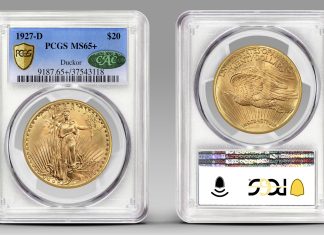
The US dollar took a direct selling hit this morning in the wake of a combination of rising risk appetite (powerful opiate, that) and the rather soft (but not unanticipated) US housing starts data.
The greenback fell to a near two-month low against the euro as global investors decided that all of a sudden European debt is not as ugly as to be untouchable. Taking cues from China and Japan? Perhaps. Few, if any players, appeared to take note of Germany’s plan to help Greece buy back its own securities. Some view the scheme as nothing short of a debt restructuring for Greece.
Be all of that as it may, it seems that ECB officials (as of this morning, anyway) have now shifted into "R" (or, at least "N") and are trying to paper over some of last week’s hawkish tones. In the wake of remarks made last week by Jean-Claude Trichet, the common currency gained about five pennies against the greenback as market coffee-grounds readers divined higher interest rates in the offing within those words. The hawk’s wings were clipped just a tad today. After all, too strong a euro could hit Old World exports just at the time when it would be least desirable to have such a thing happen.
Also helping in the restoration of said appetite for risk, were a number of unofficial source news leaks from China. It has been said that data to be released on Thursday will reveal that the Chinese economy grew at 10.3 per cent in 2010. That is still a level that is above expectations, but it was also suggested that the data will show that inflationary pressures have eased somewhat as 2011 began.
The news leaks dampened some of the lingering fears that Beijing might take more monetary tightening actions in the near future. As a consequence, risk assets (read: most commodities) gained across the board on the perception that the US housing sector’s anemia might motivate the Fed to keep its liquidity spigots open for a while longer than has begun to be anticipated of late (which is not much beyond mid-year).
Gold’s early gains (it rose to highs near the $1,380.00 level on the offer side of spot) narrowed considerably as the morning wore on, and they did so despite not much of a recovery in the US dollar on the trade-weighted index (still down 0.43 at 78.58 at last check). About the same could be said about silver as well; it opened strong, rose to highs near $29.50 and then fell back to the mid- $28 level.
Silver players took profit, as well as a mental note of a putatively large, 4.5 million ounce outflow of the metal from iShares’ ETF. Of note this morning, the little-known fact that precious metals constitute 76 percent (!) of the $157 billion in commodity assets under management via ETPs (exchange-traded products). Such a paradigm might well be viewed as a double-edged sword, actually. As might also be the case for the revelation that the hedge fund industry’s assets grew to a near-record of $1.92 trillion (yes, that’s a "T" all right) by the end of 2010.
Platinum and palladium were largely unaffected by the gyrations seen in gold and in silver. The former gained $16 to achieve a print at $1,854.00 per ounce but remained some 1% higher even after retracing some of the gains, while the latter remained $6 ahead on the session, quoted at $817 (after having touched the $832.00 mark earlier). The gravity-defying price developments in the PGM niche are at least partially accounted for by reasonably strong fundamentals, as we have oft pointed out here.
That said, players ought not to ignore the fine detail in the various news bits on the automotive front. For example. China’s car sales (a very important contributor to recent PGM sector price strength) might take a 17% "haircut" in the current year (according to Credit Suisse-sourced analysis). The Chinese government has proposed stringent regulation on car registrations for 2011. Aiming to cut the utter chaos that is known as Chinese urban auto traffic patterns, Beijing’s leaders have suggested that only 240,000 vehicles may be registered this year, as opposed to the more than 800,000 that were added to such lists in 2010.
The commodity feeding frenzy continued unabated as funds threw…more funds at the copper market, helping the orange metal reach a new record (near $4.47 per pound). Meanwhile, certain news headlines urge us to be "grateful" that commodity prices are rising. Once again, that depends on who is asking, and who is being asked, as well.
Ask Charles Morris, the head of HSBC’s Global Asset Management Absolute Return Fund, and he might tell you that he favors equities (Coke among them) over gold for this year, at least. His $2.5 billion fund recently cut its gold holdings in half (from 12 percent in QIV) as perceptions that gold "has run ahead of itself" prompted an asset reshuffle in the fund. There is no material change in the HSBC fund’s long-term bullish view on the yellow metal, but, for the time being, it (via Mr. Morris) remains:
"cautious on gold until it demonstrates strength against equities, which also pay dividends."
The Thursday housing numbers added up to a mixed bag, basically. Yes, housing starts fell 4.3% in December (to an annualized rate of 529K), which was more than had been expected. There was no detail as to holiday or weather-related issues contributing to the not-so-well…built figure. However, building permits showed a hefty, 16.7% rise in the same month. Many regard that metric as a much more accurate indicator of home building activity. Thus, once again, the headline discourages, while the detail encourages. Or, vice-versa. Read on:
"Average pay per employee at JPMorgan Chase & Co.’s investment bank fell 2.4 percent in 2010 to $369,651 from $378,600 in 2009, according to the New York-based bank’s results last week. JPMorgan is the second-biggest U.S. bank by assets and Goldman Sachs is the fifth-biggest."
And you thought you had it tough…
Chinese Premier Hu is about to find out what the "temperature" is in Washington. Many have scaled back last week’s expectations that the Chinese leader will find a warm/fuzzy reception as he visits. However, Dean Thompson, the Director of China Studies at the Nixon Centre disputes the growing groups of skeptics and asserts that
"He’s [Mr. Hu] being received with warmth. He’s not staying at the Motel 6 in Alexandria."
Until tomorrow, hang in there, bonus or no bonus…State dinner, or just a party tray.
Jon Nadler
Senior Analyst
Kitco Metals Inc.
North America
www.kitco.com and www.kitco.cn
Blog: http://www.kitco.com/ind/index.html#nadler










